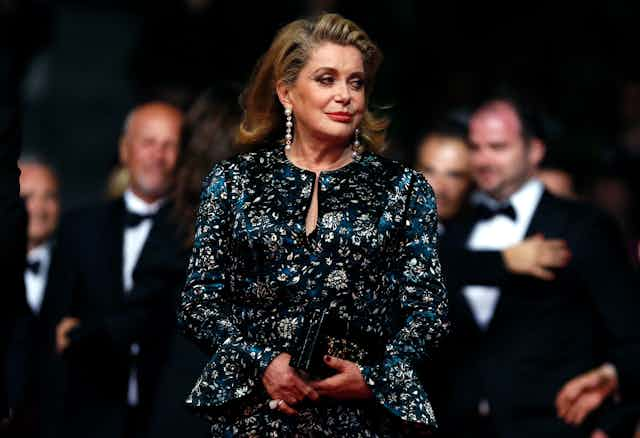The recent publication in French newspaper, Le Monde, of an open letter by female writers and actors in defence of men’s right to pick up women has left many people bemused. The letter, signed by 100 women including celebrated French actress Catherine Deneuve, said that the #metoo movement had gone too far and that it “chains women to the status of eternal victim”.
It’s not the first time this decade that globalising Anglo-US feminism and other national cultures have found themselves singing from different hymn-sheets. In 2011, charges of sexual harassment against then IMF boss Dominique Strauss-Kahn elicited significantly less outrage in France than in Anglophone countries. At home the politician was publicly defended by such well-known figures as self-proclaimed philosopher Bernard Henry-Lévy, the respected criminal attorney and former minister of justice Robert Badinter, former socialist minister of culture Jack Lang – and even feminist Elisabeth Badinter, who has long scolded some French feminists for aligning themselves with a “victimising” American feminism.
Meanwhile, much of the criticism of DSK in the US media was difficult to extricate from nationalistically inflected expressions of cultural superiority, over which France and the US have a long history of coming to blows. The allusions in the recent French letter to puritanism, a concept synonymous with American values in France, suggest anxieties about protecting a way of life perceived to be under threat as a whole.
As French critic Noël Burch has noted, the tradition of libertinage is “an element of our cultural identity recognised the world over and no doubt the envy of many”. Writing in 2008, Burch suggested that an attachment to the cult of seduction motivated the signing of another document by several of the same women behind the present letter, whom Burch dubbed “literary salon feminists” – a petition published in Elle magazine in support of the ban of the Muslim hijab in French schools.
As he pointed out, what is revealing is that many of its signatories also lent their name shortly afterwards to a protest against the regulation of cruising in France, with the result that these issues arguably became de facto interlinked in public perception. What these women seemingly objected to in both cases was any threat to women’s and girls’ availability for “legitimate” public sexualisation in their everyday lives.
Among those involved in all these campaigns have been celebrity writers of sexually explicit novels, Catherine Millet and Catherine Robbe-Grillet, who were among five women responsible for the text of the Le Monde letter. Further noteworthy signatories of the Elle petition referenced by Burch included public intellectual Marcella Iacub and “extreme” filmmaker Catherine Breillat.
Iacub is well-known for having championed her former lover DSK in a memoir entitled Beauty and the Beast, in which she defended his “porc” (literally, pig) tendencies as vital and liberating in their very amorality. This is a somewhat ironic formulation when we consider the emergence, post-Weinstein, of the anti-harassment campaign #Balancetonporc meaning roughly “shop chauvinist pigs” (a brilliant pun on the classic pavement leer “balance ton corps” or “swing your body”).
Breillat is relevant to today’s debate through her professional association with the Italian actress Asia Argento. Argento starred in the director’s 19th-century period drama, Une Vieille Maîtresse (The Last Mistress) and is one of the most prominent figures to have accused Harvey Weinstein of rape. Une Vieille Maîtresse is the most explicit of three literary adaptations in which Argento has embodied libertinage in the historical contexts with which it is primarily associated – the others being La Reine Margot and Marie Antoinette, in both of which she plays a courtesan.
Argento’s case highlights the way in which life can imitate art, which is why it matters a great deal precisely how women are understood by cultural narratives as well as in professional and other social contexts, in the entertainment industry and beyond. It also serves as a reminder that France is not the only country to have pushed back against the present moment’s calls for change, emblematised by #MeToo. The Italian press’s reaction to Argento’s accusations has been so virulent that she has been forced to flee the country.
Golden Globes
Nor, of course, have most French feminists sided with the group given a platform in Le Monde. France’s secretary of state for equality, Marlène Shiappa, as well as the former minister for women’s rights Laurence Rossignol and militant feminist Catherine De Haas and the organisation Osez le Féminisme (Dare to be Feminist) have been among critics of its position.

Feminism is far from being a monolithic body in any context – and questions of sexual “freedom” expressed through display and seduction have often proved controversial not only in France, as for instance demonstrated by the divisive issues raised by the 2011 Toronto SlutWalk.
Disconcertingly out of touch though the “salon feminist” position may be, you don’t need to be a puritan to recognise the wisdom of the biblical doctrine of “Let s/he who is without sin cast the first stone” in these matters. It’s easy to be a hypocrite if you aren’t careful.

